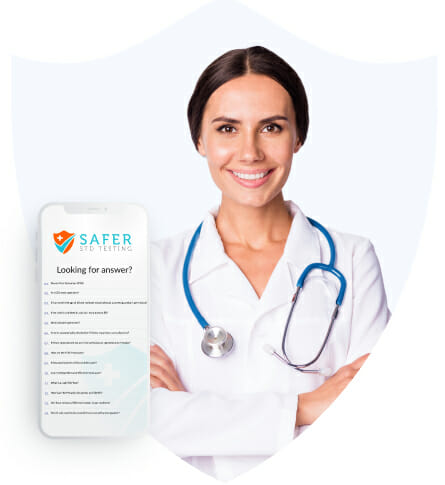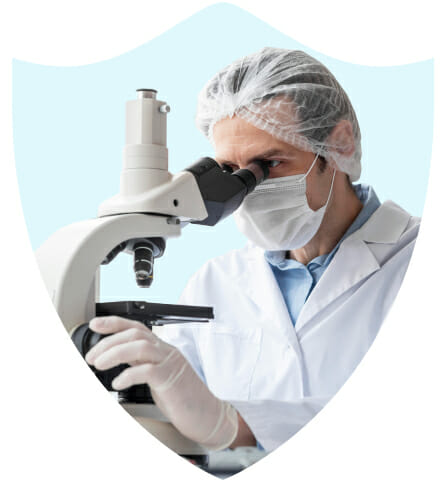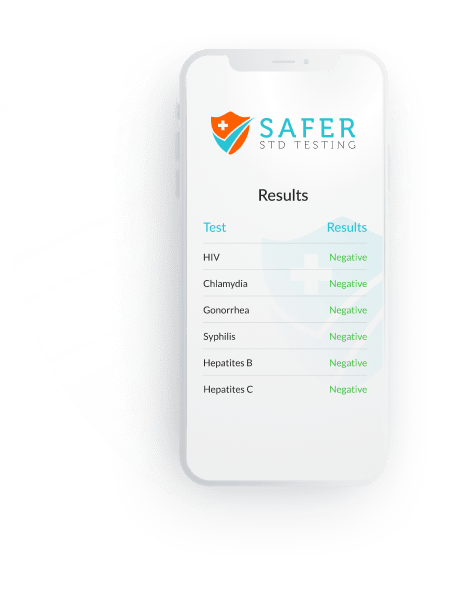

Even though this is one of the most commonly asked questions, it is almost impossible to answer. The tests are Fast, Private and Affordable even if you’re paying out of pocket. Dedicated care advisors at the toll free number provided above can help answer any additional questions regarding cost and payment at one of the private STD testing locations.
For public testing clinics it is even harder to predict. Many of them do not provide availability of all STD tests. Some tests are free but for many you have to pay out of pocket based on their eligibility criteria. To get additional information, please visit our location page to select a public clinic and contact them directly.
While the law can vary from state to state in most cases you can get tested for all STDs without signed consent from a parent or guardian even if you are age 17 or younger, though it is still a good idea to check with the local laws in your area.
The law requires that your visit and subsequent test is completely confidential and the results will never be shared with an outside party, and this is one of the reasons why you need a photo ID to confirm your identity. The picture ID card ensures staff that the results are being released to the right person, and it also helps the office personnel keep accurate records about their patients’ health. Already having your information on file also helps to improve your experience on future visits, and it can even speed up the procedure.
It is important for all clients to remember that all personal information regarding your health status is strictly confidential, and cannot be released without your explicit written consent. This also applies to any patients who are 17 years old or younger.
Unless you are honest with your health care provider about your sexual activity or have specifically requested STI testing as part of your annual physical, it will not be included in your exam. An annual physical is simply a routine checkup to ensure that there are not any noticeable problems, and most health care practitioners do not consider STI testing a part of a regular exam.
The answer to this question is a little more complicated than a simple “yes or no”. You can get tested for any of the sexually transmitted diseases whenever you want, but some of the viruses might not be able to be detected. The incubation period can vary from a couple of days up to 6 weeks or longer for some STDs, which makes it important for you to return for another test. Contact a care advisor so they can give you the right custom recommendation.
Some STDs can be effectively treated and cured. Gonorrhea and Chlamydia can be cured with antibiotics, along with Syphilis. It is important to start treating Syphilis early, before it begins to adversely affect your health. Hepatitis C can be cured with specific antiviral drugs. Herpes can be treated but there is currently not a permanent cure for the virus, and the same is also true for HIV and Hepatitis B. Even though there is still not a cure for all STDs, treatment programs are capable of effectively managing the signs and symptoms so you can lead a normal and healthy life. But the first step is to get tested for STDs.
Even if you have just been treated for an STD, it is possible to contract the same one again or a different type of STD. You are never completely immune from STDs, which is why it is important to keep getting retested on a regular basis. The exception is that if you have antibodies against the hepatitis B virus to due to a prior hepatitis B infection or vaccine series, you’re immune to future hepatitis B infections[2].
There might be times when you don’t want to wait for the results of a standard HIV test. A rapid HIV test – done with blood from a finger prick or an oral swab – can get the results back to you within a few minutes[3]. While the results are generally accurate, it is important to remember that the oral swab only checks for HIV and not any of the other sexually transmitted diseases. In most cases the only time this procedure is recommended is if you are worried about exposure to HIV and are not willing to wait for the standard test results.
One of the main reasons people put off STD/STI testing is the shame and embarrassment they feel when they run into familiar faces at the health center. We understand this reluctance to have others involved in the problems or issues you might be facing in regards to your sexual health, and we are dedicated to helping you get tested privately.
Our Preferred Service Providers can help you to get tested privately at one of 4,000 plus labs located around the country. They work together with these private labs to ensure your complete confidentiality.
When you are ready to take advantage of the private STD testing service, the process is quick and easy. You will need to pick up the phone and call the provided toll free number, and the helpful operator will walk you through the appointment process which will allow you to avoid the crowded community centers.
With a scheduled appointment at one of the private labs affiliated with our Preferred Service Provider, you will be able to relax and be tested without worrying about running into friends or family.
The STD test will only take 15 to 20 minutes which will still leave you with ample time to accomplish the rest of day’s tasks. One simple phone call is all that it takes to be privately tested for all of the STD/STIs.
You do not have to have a STD test performed in order to purchase condoms from a drug store, and the pharmacist will not insist on seeing your results. The CDC encourages everyone who is sexually active to use condoms, and there are often clinics around the city that offer the prophylactics for free. Some bars and nightclubs even have condoms by the door for patrons to grab on the way out. It is important to remember that while a condom can prevent STDs, it is still recommended that you get tested on a regular basis.
It is important to be tested for STDs after having sex with a new partner, but this is not the only time you need to think about your sexual health. It is important to remember that not all STDs are spread solely through sexual activity, and even those who have been with the same partner for years can still contract an STD. Screening for STDs should be part of your regular health care routine, not something that is only done when you are with a new partner.
Recent statistics released by the CDC estimate that there are over 750,000 Americans newly infected with genital Herpes virus infections each year[4]. While the number of infections is sobering, so is the fact that Herpes can be spread even when there are not any obvious signs or symptoms. More than 80% of the 14 to 49 year olds in the US who have the HSV-2 variety of Herpes infection have never been formally diagnosed with the condition[4]. In many cases the only way to know if you are infected is to be tested.
The contraceptive pill is only able to prevent pregnancies and has no effect on preventing the spread or contraction of STDs. This myth is particularly dangerous to teens, and is one of the contributing factors to the high STD rates according to the CDC.
There have been some reports of Chlamydia going on away on its own, without treatment. However, there's no way to predict if a Chlamydia infection (or any other STD) will go away by itself. It's much safer to assume that any STD requires treatment with medications. If treatment is delayed serious health complications can develop, and even lead to eventual death.




